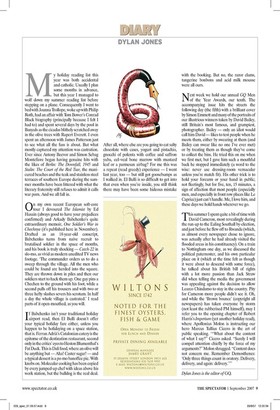FLK
DYLAN JONES My holiday reading list this year was both accidental and catholic. Usually I plan some months in advance, but this year I managed to wolf down my summer reading list before stepping on a plane. Consequently I went to bed with Joanna Trollope, woke up with Philip Roth, had an affair with Tom Bower's Conrad Black biography (principally because I felt I had to) and spent several days by the pool in Banyuls as the cicadas blithely scratched away in the olive trees with Rupert Everett. I even spent an afternoon with James Patterson just to see what all the fuss is about. But what mostly captured my attention was castration. Ever since Antony Beevor and Simon Sebag Montefiore began having genuine hits with the likes of Berlin: The Downfall, 1945 and Stalin: The Court of the Red Tsar, the manicured beaches and the teak and stainless steel terraces of southern Europe during the summer months have been littered with what the literary fraternity still refuses to admit it calls war porn. And we all fall in.
n my own recent European soft-core tour I devoured The Islamist by Ed Husain (always good to have your prejudices confirmed) and Arkady Babchenko's quite extraordinary memoir, One Soldier's War in Chechnya (it's published here in November). Drafted as an 18-year-old conscript, Babchenko turns from naive recruit to brutalised soldier in the space of months, and his book is truly shocking — Catch-22 in slo-mo, as vivid as modern unedited TV news footage. 'The commander orders us to do a sweep through the village. All the men who could be found are herded into the square. They are thrown down in piles and then our soldiers start to hack them up. One guy pins a Chechen to the ground with his foot, while a second pulls off his trousers and with two or three hefty slashes severs his scrotum. In half a day the whole village is castrated.' I read parts of it open-mouthed, as you will.
If Babchenko isn't your traditional holiday airport read, then El Bulli doesn't offer your typical holiday fare either, unless you happen to be holidaying on a space station, that is. Ferran Adria's Catalonian eatery is the epitome of the destination restaurant, second only in the critics' eyes to Heston Blumenthal's Fat Duck. This is Dali food, where an olive will be anything but — Aha! Caster sugar! — and a typical dessert is a p0-mo banoffee pie. With knobs on. Molecular cooking has been copied by every jumped-up chef with ideas above his work station, but the bulldog is the real deal.
After all, where else are you going to eat salty chocolate with cases, yogurt and pistachio, gnocchi of polenta with coffee and saffron yuba, eel–veal bone marrow with mustard leaf or a parmesan airbag? For me this was a repeat (read greedy) experience — I went last year, too — but still got goosebumps as I walked in. El Bulli is so difficult to get into that even when you're inside, you still think there may have been some hideous mistake with the booking. But no, the razor clams, tangerine bonbons and acid milk mousse were all ours.
Next week we hold our annual GQ Men of the Year Awards, our tenth. The accompanying issue hits the streets the following day (the fifth) with a brilliant cover by Simon Emmett and many of the portraits of our illustrious winners taken by David Bailey, still Britain's most famous, and grumpiest, photographer. Bailey — only an idiot would call him David — likes to test people when he meets them, either by swearing at them (and Bailey can swear like no one I've ever met) or by treating them as though they've come to collect the bins. He tried this on me when we first met, but I gave him such a mouthful back he stopped immediately (a word to the wise: never use dressing-room vernacular unless you're match fit). His other trick is to hold your forearm or your hand in public; not fleetingly, but for five, ten, 15 minutes, a sign of affection that most people (especially men, and especially in front row places like Le Caprice) just can't handle. Me, I love him, and these days we hold hands wherever we go.
This summer I spent quite a bit of time with David Cameron, most revealingly during the run-up to the Ealing Southall by-election, and just before he flew off to Rwanda (which, as almost every newspaper chose to ignore, was actually after he had already visited the flooded areas in his constituency). On a train to Nottingham one day, as we discussed the political paternoster, and his own particular place on it (which at the time felt as though it were about to descend with some force), he talked about his British bill of rights with a lot more passion than Jack Straw did when telling the media the government was appealing against the decision to allow Learco Chindamo to stay in the country. Pity for Cameron more people didn't see it. Oh, and while the 'Brown bounce' (copyright all newspapers) has taken everyone by storm (not least the rubberised PM himself), may I refer you to the opening chapter of Robert Harris's Imperium (yet another holiday read), where Apollonius Molon is instructing our hero Marcus Tullius Cicero in the art of public speaking. "What about the content of what I say?" Cicero asked. "Surely I will compel attention chiefly by the force of my arguments?" Molon shrugged. "Content does not concern me. Remember Demosthenes: 'Only three things count in oratory. Delivery, delivery, and again: delivery.'" Dylan Jones is the editor of GQ.







































 Previous page
Previous page